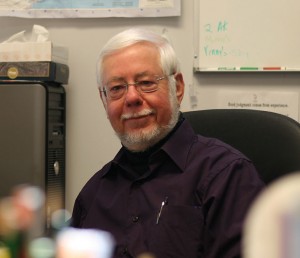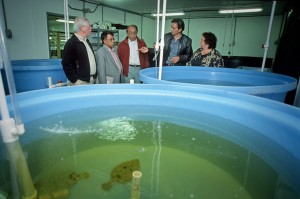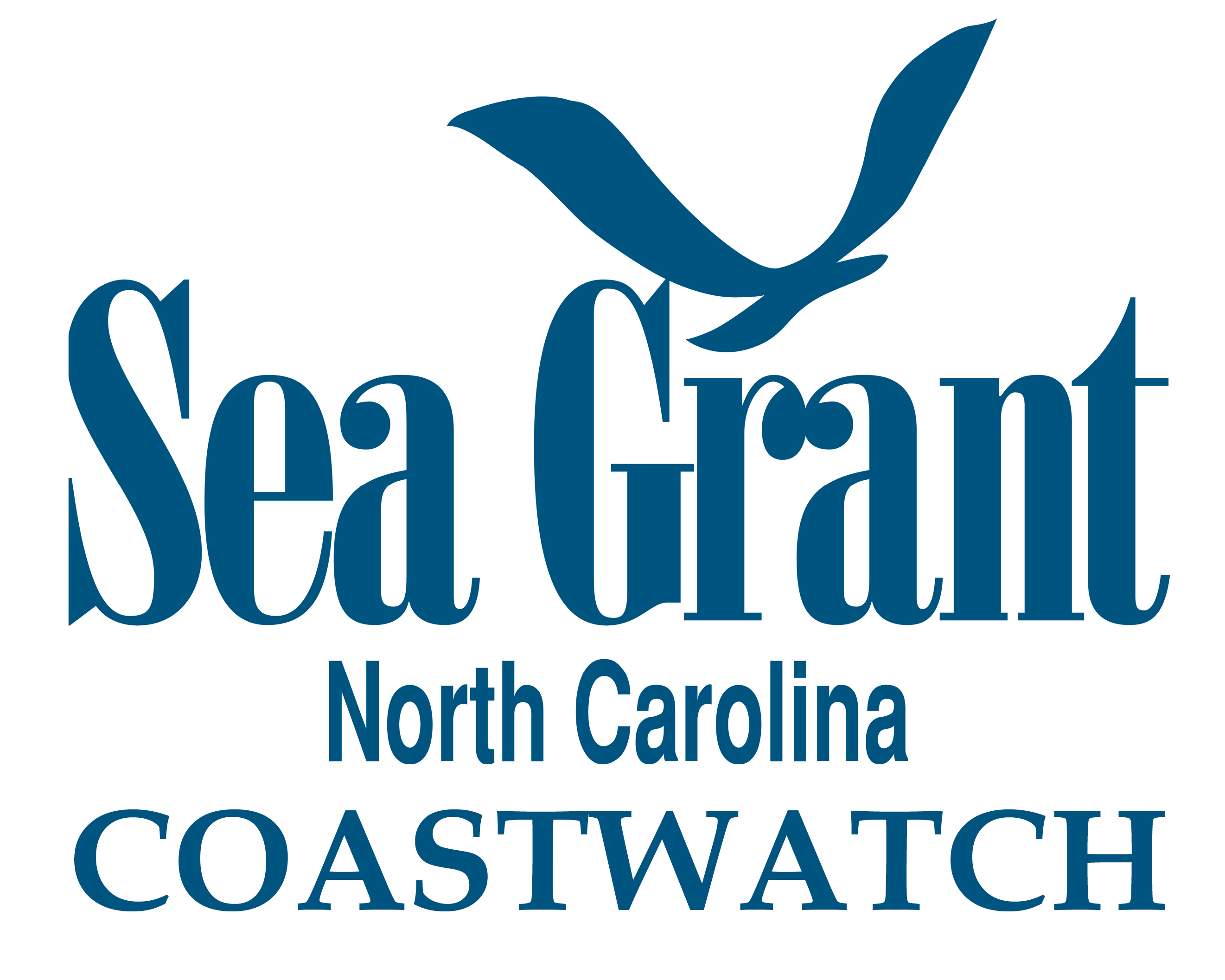By E-CHING-LEE
When colleagues discuss Steve Rebach, they use many adjectives — Passionate, efficient, smart, but invariably, they all agree on one thing: when Rebach is around, there will be laughs.

Steve Rebach is known for his sense of humor. Photo by E-Ching Lee.
Rebach, North Carolina Sea Grant’s associate director, retired at the end of 2012. He joined Sea Grant in 2000, fresh from a 31- year stint in academia, including many years in the biology department at the University of Maryland Eastern Shore.
“Steve is the quintessential research coordinator for an organization such as North Carolina Sea Grant,” says Michael Voiland, Sea Grant executive director who retired at the same time. “He has a broad grasp of the marine science field while maintaining specialized expertise in fisheries, which is a strong component of Sea Grant.”
Ron Hodson, Voiland’s predecessor, remembers that selecting Rebach boiled down to several factors.
“He was very, very, eager to work for Sea Grant,” Hodson recalls, adding that Rebach “was a good choice to be heading up the research effort. And he’s done a good job with that.”
Rebach explains his role simply: “Everything that comes in here that is competitive, it’s my role to get strong reviews and to present the work to a professional peer panel.”
Besides research quality, Rebach cites another important contribution. “I think the biggest change that may be attributed to me is going from paper to electronics,” he says of the proposal process, noting that Sea Grant was still requiring paper submissions in 2000.
“We started moving right away to email, and then Webnibus and now eSeaGrant,” explains Rebach, naming two online tracking systems that he championed.
HANDLING THE RESEARCH
In his tenure, Rebach had managed the N.C. Fishery Resource Grant Program that was in its early stages when he started, and the N.C. Blue Crab and Shellfish Research Program that began after he joined.
He also collaborated with Sea Grant partners — the N.C. Division of Marine Fisheries, the N.C. Coastal Reserve and the Water Resources Research Institute of the University of North Carolina, among others — on joint fellowships, and with the National Oceanic and Atmospheric Administration Fisheries on the Bycatch Reduction of Marine Mammals in Mid-Atlantic Fisheries Program.

Rebach visits an aquaculture facility with NC State faculty and Sea Grant guests. Photo courtesy NCSU Communications Services.
Rebach enjoyed the variety and challenges Sea Grant presented after decades of teaching and research.
“What Sea Grant did for me was, all of a sudden, I’m reading about fisheries which I didn’t do before, about beach erosion, about coastal communities. And I think this has been the most broadening part of my education since I was in college taking general courses,” he says. “It’s been a wonderful experience.”
In particular, Rebach points to the applied research that Sea Grant supports. Scientists, particularly those funded by the FRG and Blue Crab programs, are required to ensure that their work is in collaboration with and can be used by stakeholders, be they commercial fishermen, recreational anglers or the general public.
David Taylor, chief of the state’s Fisheries Management Section, reviewed FRG proposals with Rebach. “Steve played a major role in seeing that we were all well-prepared for discussion and made us feel that our time and input were valuable,” he says.
Taylor notes that Rebach handled most of FRG’s nitty-gritty details, including distributing proposals to reviewers, taking notes, and even tracking comments and recommendations. And he praises Rebach’s understanding of the issues.
“He participated in discussions of the proposals and was very aware and knowledgeable of existing research in the fields we dealt with, particularly crustacean projects,” Taylor adds. “I wish him well in his well-earned retirement.”
Jeff Buckel, a faculty member in the biology department at North Carolina State University’s Center for Marine Sciences and Technology, is the Sea Grant mentor for the joint Sea Grant/DMF fellowship. This program offers graduate students the opportunity to spend a year working on a critical management topic facing important marine resources.
“Steve’s been involved in every interview of every Sea Grant/DMF fellow,” says Buckel, who collaborates with Rebach to screen potential applicants. “It’s going to be big shoes to fill, that’s for sure,” he adds.
“I learned a lot from both Steve and Ron Hodson on how to handle candidates as they’re coming through,” Buckel explains. He cites valuable interview techniques, from how to put an interviewee at ease, to how to practice discretion, such as making sure applicants enter in one door and leave through another so they never meet the competition.
“I certainly draw on that experience when I interview my own grad students now,” he says.
But Buckel, a successful Sea Grant-supported researcher with multiple projects under his belt, also interacts with Rebach on the receiving end of things.
“When I think of Steve, I think of his phone calls,” Buckel says with a laugh. Rebach typically calls applicants to notify them about the status of their proposals.
“You hear his voice and you think, ‘I hope this is good news about the grant.'” Often, these initial conversations are the start of cost negotiations and project adjustments, Buckel notes.
WORKING WITH PARTNERS
Rebach also has made contributions to regional and national Sea Grant programs.
He collaborated with NOAA Fisheries folks to run a marine mammal grant program, modeled along the lines of the FRG, to learn more about dolphin stocks and reduce marine mammal bycatch.
This bycatch reduction research supports two NOAA programs — the Bottlenose Dolphin Take Reduction Plan and the Pelagic Longline Take Reduction Plan.
“Steve helped us figure out a way to help meet some of our bycatch reduction needs in terms of research recommendations that were coming out of our stakeholder groups and what information is needed to help reduce bycatch of marine mammals in those fisheries, while still allowing those fisheries to thrive,” says Stacey Horstman, bottlenose dolphin conservation coordinator with NOAA Fisheries in the Southeast Regional Office.
“We have had some really, really good outcomes, and every step of the way, he’s there to help do whatever he needs to do to make it happen,” she continues.
Horstman had been working with Rebach since the start of the bycatch grant program in 2004. They have had calls for proposals most years. There even are funds for 2013, something Rebach’s successor will inherit.
On the national stage, Rebach led the Sea Grant Research Coordinators Network from 2006 to 2008.
The group consists of his counterparts from Sea Grant programs nationwide. He was an important figure in the development of this network.
“Steve was really instrumental with the research coordinators in starting the discussion to move the research coordinators towards becoming a formal network within the Sea Grant Association,” recalls Fredrika Moser, who worked with him to formalize the group when she headed research at Maryland Sea Grant.
“He started with work on developing bylaws and basically getting agreement through the network to become formal,” adds Moser, who now is director of Maryland Sea Grant. Through this group, research coordinators are able to have a presence on the National Sea Grant Network Advisory Council that helps to shape the direction of nationwide efforts.
But more than his leadership abilities, Moser notes that Rebach is a good collaborator.
“He always brings good humor and thoughtfulness to any of the issues we’ve worked on together,” she says, wishing him the best in retirement. “It’ll be a loss to the network.”
MAKING AN ADJUSTMENT
Old habits die hard — and retirement won’t keep Rebach from reviewing proposals. He has volunteered to sit on a committee that decides how proceeds from a local art festival should be allocated to nonprofit organizations in his community. Rebach will review proposals and help decide how to distribute the funds.
“It’s something I’ve done before,” he notes wryly.
But perhaps retired life might be a change after decades of working.
“The first thing that comes to mind is the difficulty Dad is going to have in adapting to unstructured life,” says Ben, Rebach’s elder son. “This will be the first time without a job since he was 11. I have no doubt he will adapt, but I know that he is still struggling with the concept.”
Melinda Baran, Rebach’s partner, also is confident that he will adjust. “I’m sure he’ll be as focused on his freedom as he has been as associate director of Sea Grant,” Baran says. She will retire in the spring and is looking forward to checking off more items on their “bucket list.”
True to her prediction, Rebach already has plans for his free time. “I will read 20 years of piles of stuff that I said I’m going to read as soon as I get a chance,” he says, adding that sons Ben and Ari have given him a lifetime supply of books to read on his Kindle.
In addition, Rebach intends to travel. He has trips to Florida, Mexico and Japan in the works. His sons have encouraged him to spend his last dime on his last day, rather than worrying about their inheritance.
And Rebach is ready to meet this new challenge. “It’s time to go and play.”
This article was published in the Winter 2013 issue of Coastwatch.
For contact information and reprint requests, visit ncseagrant.ncsu.edu/coastwatch/contact/.
